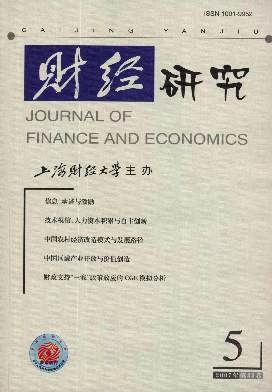财务分析师盈余预测精确度决定因素的实证分析
财经研究 2007 年 第 33 卷第 05 期, 页码:63 - 72
摘要
参考文献
摘要
文章以2004~2005年的上市公司数据为样本,分析了我国财务分析师在预测上市公司未来盈余时影响其预测精确度的主要因素。研究发现,预测机构数量的增加、盈余可预测性以及信息披露质量的提高,将伴随着高的盈余预测精确度,而盈余波动程度越大、公司规模越大,预测的精确度则越低。同时,可预测性、盈余管理、盈余波动以及公司扩张速度对分析师的悲观预测有显著的影响,而可预测性、盈余管理以及公司规模则显著影响分析师对盈余的乐观估计。
[1]Beaver W H.Perspectives on recent capital market research[J].The Accounting Re-view,2002,77(2):453~474.
[2]Brown L D.Analyst forecasting errors:Additional evidence[J].Financial Analysts Jour-nal,1997,53(6):81~88.
[3]Brown L D,G Richardson,Schwager S.An information interpretation of financial ana-lysts superiority in forecasting earnings[J].Journal of Accounting Research,1987,25:49~67.
[4]Das S,Levine C B,Sivaramakreshnan K.Earnings predictability and bias in analysis’earnings forecasts[J].The Accounting Review,1998,73(2):277~294.
[5]Dreman D N,Berry M A.Analyst forecasting errors and implications for security anal-ysis[J].Financial Analysts Journal,1995,51(3):30~41.
[6]Eames M,Glover S.Earnings predictability and the direction of analysts’earningsforecast errors[J].The Accounting Review,2003,78(3):707~724.
[7]Givoly D,Lakonishok J.The information content of financial analysts’forecasts ofearnings some evidence on semi-strong inefficiency[J].Journal of Accounting and Eco-nomics,1979,1(3):165~185.
[8]Lang M,Lundholm R J.Corporate disclosure policy and analyst behaviour[J].Ac-counting Review,1996,71(4):467~492.
[9]Kross W,Ro B,Schroeder D.Earnings expectation:The analysts’information advan-tage[J].The Accounting Review,1990,65(2):461~476.
[10]O’Brien P C.Analysts’forecasts as earnings expectations[J].Journal of Accountingand Economics,1988,10:53~83.
[11]Tamura H.Individual analyst characteristics and forecast error[J].Financial AnalystsJournal,2002,58(4):28~35.
[12]胡奕明.证券分析师的信息来源、关注域与分析工具[J].金融研究,2003,(12):52~62.
[13]胡奕明,林文雄,王玮璐.证券分析师的信息解读能力调查[J].会计研究,2003,(11):14~20.
[14]姜国华.关于证券分析师对中国上市公司会计收益预测的实证研究[J].经济科学,2004,(6):72~79.
[15]吴东辉,薛祖云.对中国A股市场上财务分析师盈余预测的实证分析[J].中国会计与财务研究,2005,(1):1~27.
[2]Brown L D.Analyst forecasting errors:Additional evidence[J].Financial Analysts Jour-nal,1997,53(6):81~88.
[3]Brown L D,G Richardson,Schwager S.An information interpretation of financial ana-lysts superiority in forecasting earnings[J].Journal of Accounting Research,1987,25:49~67.
[4]Das S,Levine C B,Sivaramakreshnan K.Earnings predictability and bias in analysis’earnings forecasts[J].The Accounting Review,1998,73(2):277~294.
[5]Dreman D N,Berry M A.Analyst forecasting errors and implications for security anal-ysis[J].Financial Analysts Journal,1995,51(3):30~41.
[6]Eames M,Glover S.Earnings predictability and the direction of analysts’earningsforecast errors[J].The Accounting Review,2003,78(3):707~724.
[7]Givoly D,Lakonishok J.The information content of financial analysts’forecasts ofearnings some evidence on semi-strong inefficiency[J].Journal of Accounting and Eco-nomics,1979,1(3):165~185.
[8]Lang M,Lundholm R J.Corporate disclosure policy and analyst behaviour[J].Ac-counting Review,1996,71(4):467~492.
[9]Kross W,Ro B,Schroeder D.Earnings expectation:The analysts’information advan-tage[J].The Accounting Review,1990,65(2):461~476.
[10]O’Brien P C.Analysts’forecasts as earnings expectations[J].Journal of Accountingand Economics,1988,10:53~83.
[11]Tamura H.Individual analyst characteristics and forecast error[J].Financial AnalystsJournal,2002,58(4):28~35.
[12]胡奕明.证券分析师的信息来源、关注域与分析工具[J].金融研究,2003,(12):52~62.
[13]胡奕明,林文雄,王玮璐.证券分析师的信息解读能力调查[J].会计研究,2003,(11):14~20.
[14]姜国华.关于证券分析师对中国上市公司会计收益预测的实证研究[J].经济科学,2004,(6):72~79.
[15]吴东辉,薛祖云.对中国A股市场上财务分析师盈余预测的实证分析[J].中国会计与财务研究,2005,(1):1~27.
引用本文
石桂峰, 苏力勇, 齐伟山. 财务分析师盈余预测精确度决定因素的实证分析[J]. 财经研究, 2007, 33(5): 63–72.
导出参考文献,格式为:





 8258
8258  535
535

